
Nutrients
Scope & Guideline
Connecting insights to improve dietary practices worldwide.
Introduction
Aims and Scopes
- Nutritional Epidemiology and Public Health:
Research examining the relationship between dietary patterns, nutrient intake, and health outcomes at the population level. This includes studies on dietary habits, public health interventions, and the impact of nutrition on chronic diseases. - Clinical Nutrition and Therapeutics:
Investigating the efficacy of dietary interventions and nutritional supplements in clinical settings. This encompasses randomized controlled trials and observational studies that assess the effects of specific nutrients or dietary patterns on health conditions. - Food Science and Technology:
Exploration of the nutritional properties of food, food processing, and the development of functional foods. This area includes studies on food bioactives, food composition, and innovative food technologies. - Microbiome and Nutrition:
Research focusing on the interaction between diet, gut microbiota, and health. This includes studies on prebiotics, probiotics, and postbiotics, as well as their roles in metabolic health and disease prevention. - Nutritional Biochemistry and Molecular Nutrition:
Studies investigating the biochemical mechanisms through which nutrients exert their effects on human health. This includes research on metabolic pathways, nutrient metabolism, and the role of micronutrients in disease prevention.
Trending and Emerging
- Personalized Nutrition:
An increasing focus on tailoring dietary recommendations based on individual genetic, metabolic, and lifestyle factors. This trend reflects the growing recognition of the need for personalized approaches to nutrition. - Nutritional Psychiatry:
Research exploring the connections between diet, mental health, and cognitive function is gaining traction. This area investigates how specific dietary patterns and nutrients can influence mood and mental well-being. - Sustainable Nutrition:
Emerging studies addressing the sustainability of dietary patterns, including plant-based diets and their environmental impacts. This trend is driven by a growing awareness of food systems and their effects on health and the planet. - Gut-Brain Axis and Microbiota Interactions:
Increased interest in how gut microbiota influence mental health, cognitive function, and overall well-being. Research is focusing on the role of dietary components in modulating gut microbiota and their implications for health. - Nutraceuticals and Functional Foods:
A rising emphasis on the health benefits of specific food compounds and dietary supplements, including their potential therapeutic roles in managing chronic diseases.
Declining or Waning
- Traditional Dietary Patterns:
Research on traditional diets, such as the Mediterranean or DASH diets, may be waning as attention shifts towards personalized nutrition and the role of specific nutrients rather than broad dietary patterns. - General Nutritional Guidelines:
Studies focusing solely on general dietary guidelines without considering individual variability and personalized approaches are becoming less prevalent, as the field moves towards more tailored nutritional strategies. - Historical Nutritional Research:
Studies that primarily focus on historical dietary practices and their health implications are seeing a decline as contemporary research emphasizes current dietary trends and their effects on health. - Single Nutrient Studies:
Research focusing on the effects of single nutrients without considering the broader context of dietary patterns and lifestyle factors is decreasing, as integrated approaches are favored in nutritional science.
Similar Journals
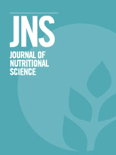
Journal of Nutritional Science
Unveiling the connections between diet and disease.The Journal of Nutritional Science, published by Cambridge University Press, is a leading open-access journal dedicated to the field of nutrition and dietary research. Established in 2012, this journal aims to disseminate high-quality research on nutrition, dietetics, and their implications for health and disease. With an impact factor reflective of its growing importance—holding Q2 and Q3 rankings in relevant categories such as Nutrition and Dietetics and Endocrinology—the journal serves as a vital platform for researchers, professionals, and students interested in evidence-based advancements within the nutritional sciences. The Journal of Nutritional Science is based in the United Kingdom and leverages a global network of experts to foster discussions that drive innovation in food science and health policies. By enabling open access to its content, it ensures that critical knowledge is readily available to the academic community and beyond, promoting a healthier, more informed society.
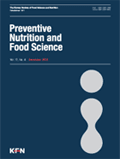
Preventive Nutrition and Food Science
Empowering Evidence-Based Nutrition for Optimal WellbeingPreventive Nutrition and Food Science, an esteemed journal published by the Korean Society of Food Science and Nutrition, serves as a pivotal platform for the dissemination of innovative research and insights in the fields of food science, nutrition, and dietetics. With an ISSN of 2287-1098 and an E-ISSN of 2287-8602, this journal is dedicated to advancing knowledge from 2012 through 2024, showcasing contributions that reflect the interplay between nutrition, health, and preventive strategies. Indexed in Scopus, it proudly holds a Q2 ranking in Food Science and a Q3 ranking in Nutrition and Dietetics as of 2023, positioning it among influential publications within these disciplines. Researchers, professionals, and students can explore cutting-edge studies that contribute significantly to evidence-based practices, enhancing public health and nutritional care. Although it operates under a subscription model, the journal plays a crucial role in fostering a deeper understanding of preventive nutrition, advocating for advancements that address contemporary dietary challenges.
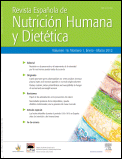
Revista Espanola de Nutricion Humana y Dietetica
Advancing nutrition knowledge for a healthier tomorrow.Revista Espanola de Nutricion Humana y Dietetica is a pivotal open-access journal dedicated to advancing the study of human nutrition and dietetics. Published by the ASOC ESPANOLA DIETISTAS NUTRICIONISTAS in Spain, this journal has been making significant contributions to the field since its inception in 2011. With an ISSN of 2173-1292 and an E-ISSN of 2174-5145, it provides researchers and practitioners with a valuable platform for disseminating innovative research, case studies, and reviews related to nutrition science. Although currently ranked Q4 in both Food Science and Nutrition and Dietetics categories (2023), the journal is committed to raising its academic profile by fostering high-quality publications that address contemporary issues in nutrition. Open access since 2012, it ensures that research is readily available to a global audience, thus promoting the exchange of knowledge and best practices. Emphasizing the importance of dietary interventions and public health nutrition, the journal encourages contributions that bridge theory and practical applications, appealing to a broad spectrum of professionals, researchers, and students within the field.
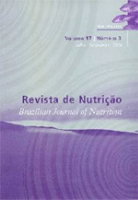
Revista de Nutricao-Brazilian Journal of Nutrition
Shaping the Future of Nutrition with Rigorous InquiryRevista de Nutricao-Brazilian Journal of Nutrition is a premier academic journal published by Pontificia Universidade Catolica Campinas, focusing on the diverse and critical field of nutrition and dietetics. With an ISSN of 1415-5273 and an E-ISSN of 1678-9865, this open-access journal has been committed to disseminating high-quality research since 1997, making it a valuable resource for researchers, professionals, and students interested in nutrition science. The journal is indexed in Scopus and currently holds a rank of #249/398 in Medicine (miscellaneous), reflecting its dedication to promoting impactful research. In the realm of Nutrition and Dietetics, it ranks #110/140, underscoring its relevance within the academic community. Located in Campinas, Brazil, the journal aims to enhance the understanding of nutritional practices and promote health-related solutions through rigorous peer-reviewed research, addressing the evolving challenges and trends in the field. As part of its objectives, it seeks to foster collaboration among researchers and contribute to the advancement of knowledge in both national and international arenas.
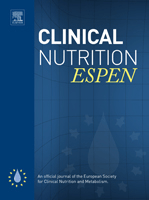
Clinical Nutrition ESPEN
Connecting Research and Practice in Clinical NutritionClinical Nutrition ESPEN is a distinguished journal published by ELSEVIER, focusing on the critical intersection of clinical nutrition and metabolic health. With an ISSN of 2405-4577, this journal serves as an essential resource for researchers, practitioners, and students in the fields of Endocrinology, Diabetes and Metabolism as well as Nutrition and Dietetics. Operating out of the United Kingdom, it has garnered a respectable Q2 ranking in both categories for 2023, indicating its significant impact and relevance in the field. Although it does not follow an open access model, the journal offers valuable insights into contemporary nutrition research, clinical practices, and dietary interventions, making it a vital tool for those committed to improving patient outcomes through nutritional science. In its evolving journey, covering work from 2015 to 2024, Clinical Nutrition ESPEN continues to shape the dialogue in nutrition research, addressing pressing health challenges and fostering innovation in dietetic practice.
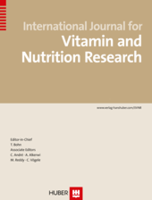
INTERNATIONAL JOURNAL FOR VITAMIN AND NUTRITION RESEARCH
Exploring the science of health through nutrition.INTERNATIONAL JOURNAL FOR VITAMIN AND NUTRITION RESEARCH, published by HOGREFE AG-HOGREFE AG SUISSE, stands as a pivotal resource in the intersecting realms of nutrition and health. With a rich publication history spanning from 1971 to 2024, this esteemed journal provides a platform for innovative research in the fields of Endocrinology, Diabetes and Metabolism, Medicine (miscellaneous), and Nutrition and Dietetics. The journal holds a respectable Q3 category ranking in these disciplines for 2023, attesting to its influence within the academic community. Although it does not offer open access, the ISSN 0300-9831 and E-ISSN 1664-2821 identifiers ensure its broad accessibility. Researchers, practitioners, and students alike benefit from its rigorous peer-reviewed content, which greatly contributes to the advancement of knowledge and best practices in nutrition research. The journal's commitment to excellence is further exemplified by its notable rankings in Scopus, where it achieves impressive standings across relevant categories. For anyone involved in the exploration of vitamins, nutrition, and their crucial roles in human health, this journal is an essential tool for staying informed and engaged with the latest scientific developments.

Current Nutrition Reports
Empowering Knowledge in Nutrition and Dietetics.Current Nutrition Reports, published by SpringerNature, stands at the forefront of nutrition and food science research, providing an invaluable resource for researchers, professionals, and students alike. Since its establishment in 2012, the journal has gained recognition for its significant contributions to the field, achieving a prestigious Q1 ranking in both Food Science and Nutrition and Dietetics categories as of 2023. With an impact factor reflecting its critical position in the academic community, this journal is dedicated to disseminating high-quality reviews and reports that synthesize the latest findings on nutritional science, public health, and dietetics. Although it operates under a non-open access model, its extensive reach and influence in prominent databases like Scopus, where it ranks in the top percentiles, underscore its importance in shaping the future of nutrition research. As the journal anticipates converging years until 2024, it promises to remain a vital platform fostering scholarly dialogue and innovation in the dynamic realm of nutrition.
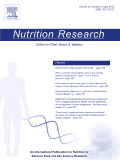
NUTRITION RESEARCH
Elevating Nutrition Knowledge Through Rigorous ResearchNUTRITION RESEARCH, published by PERGAMON-ELSEVIER SCIENCE LTD, stands as a pivotal platform for the dissemination of groundbreaking research in the fields of nutrition, dietetics, and endocrinology. With an established track record since 1981, the journal has successfully converged its academic purview into 2024, providing a continuous source of high-impact studies that address critical issues in human health and nutrition. Recognized as a Q2 journal in multiple relevant categories, including Endocrinology and Nutrition, as well as boasting respectable Scopus rankings, it serves a diverse audience of researchers, professionals, and students eager to enhance their understanding of nutritional science. Although the journal does not operate on an open access model, its contributions are invaluable, fostering advancements and collaboration within the scientific community dedicated to improving dietary practices and outcomes. The current address of the journal is THE BOULEVARD, LANGFORD LANE, KIDLINGTON, OXFORD OX5 1GB, ENGLAND, positioning it at the heart of global research initiatives.

Nutrition and Dietary Supplements
Innovative Research for Enhanced Health and Well-beingNutrition and Dietary Supplements is a premier, peer-reviewed journal published by DOVE MEDICAL PRESS LTD, dedicated to the exploration of advances in nutritional science and the role of dietary supplements in health and disease management. Since its inception, the journal has maintained an Open Access model, enabling researchers, professionals, and students worldwide to access high-quality, cutting-edge research without barriers. With an emphasis on evidence-based findings, the journal encourages submissions that evaluate the efficacy, safety, and innovation within the field of nutrition, making a significant impact on public health and dietary guidelines. The journal's ISSN is 1179-1489 and its commitment to disseminating meaningful research positions it as a vital resource for those involved in nutrition science.
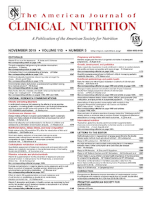
AMERICAN JOURNAL OF CLINICAL NUTRITION
Transforming health care with evidence-based nutrition insights.The American Journal of Clinical Nutrition, published by Elsevier Science Inc, stands as a premier academic platform dedicated to advancing knowledge in the fields of clinical nutrition and dietary science. With its roots tracing back to 1952, this prestigious journal boasts rigorous peer-reviewed research, providing vital insights and evidence-based findings that cater to the ever-evolving landscape of nutrition and health care. Affiliated with a strong reputation, the journal holds an impressive impact factor and is ranked in the top quartile (Q1) in both Nutrition and Dietetics and Medicine (miscellaneous), underscoring its significance in the academic community. With current Scopus rankings placing it #7 in Nursing and Nutrition and Dietetics and #20 in Medicine, it serves as an essential resource for researchers and practitioners seeking to stay at the forefront of clinical nutritional science. This journal not only disseminates groundbreaking research but also fosters collaborations among scholars, enhancing the clinical implications of nutrition practices globally. Access to the journal may vary, given its non-open access format; however, its contributions remain indispensable to professionals and students alike striving to deepen their understanding of clinical nutrition.